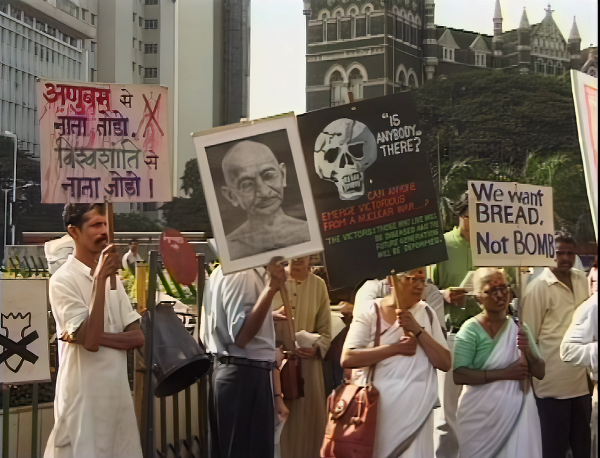Father, Son, and Holy War explores the psychology of violence against "the other" in two parts, “Trial by Fire” and “Hero Pharmacy.” It examines the relationship between universal ideals and passionate group identifications. Patwardhan feels minorities are scapegoats of every calamity as nations subdivide into religious and ethnic zones, each seemingly eager to annihilate the other or extinguish itself on the altar of martyrdom.
Father, Son, and Holy War will be preceded by the short film
Ribbons for Peace.
“ Father, Son, and Holy War, through a careful layering of images, views and counter-views takes you far beyond the generally superficial vision of Indian politics that the standard television documentary delivers." - Pervaiz Khan, London Film Festival
"Anand Patwardhan's impressive, passionate documentary explores in great detail the roots of sectarian violence in India today. A natural for cutting-edge TV docu slots, the film, which is extremely well researched and assembled, should also be widely seen at upcoming fests." - David Stratton, Variety
Anand Patwardhan, India’s leading documentary filmmaker, is known for his socio-political, award-winning films. He has spent decades capturing Mumbai’s slum dwellers, the reality of the caste system, the rise of Hindu nationalism, and tensions between India and Pakistan. He is a member of the Oscar academy, and his films have earned more than 20 international awards.
If there is anything we can do to make this event accessible to you, please contact us. Please be aware that advance notice is necessary as some accommodations may require more time for the university to arrange.
“ Father, Son, and Holy War, through a careful layering of images, views and counter-views takes you far beyond the generally superficial vision of Indian politics that the standard television documentary delivers." - Pervaiz Khan, London Film Festival
"Anand Patwardhan's impressive, passionate documentary explores in great detail the roots of sectarian violence in India today. A natural for cutting-edge TV docu slots, the film, which is extremely well researched and assembled, should also be widely seen at upcoming fests." - David Stratton, Variety
Anand Patwardhan, India’s leading documentary filmmaker, is known for his socio-political, award-winning films. He has spent decades capturing Mumbai’s slum dwellers, the reality of the caste system, the rise of Hindu nationalism, and tensions between India and Pakistan. He is a member of the Oscar academy, and his films have earned more than 20 international awards.
If there is anything we can do to make this event accessible to you, please contact us. Please be aware that advance notice is necessary as some accommodations may require more time for the university to arrange.
| Building: | Modern Languages Building |
|---|---|
| Event Type: | Film Screening |
| Tags: | Asia, Film, Film Series, Human Right, India |
| Source: | Happening @ Michigan from Center for South Asian Studies, International Institute, Department of Film, Television, and Media, Weiser Center for Emerging Democracies, Asian Languages and Cultures |


